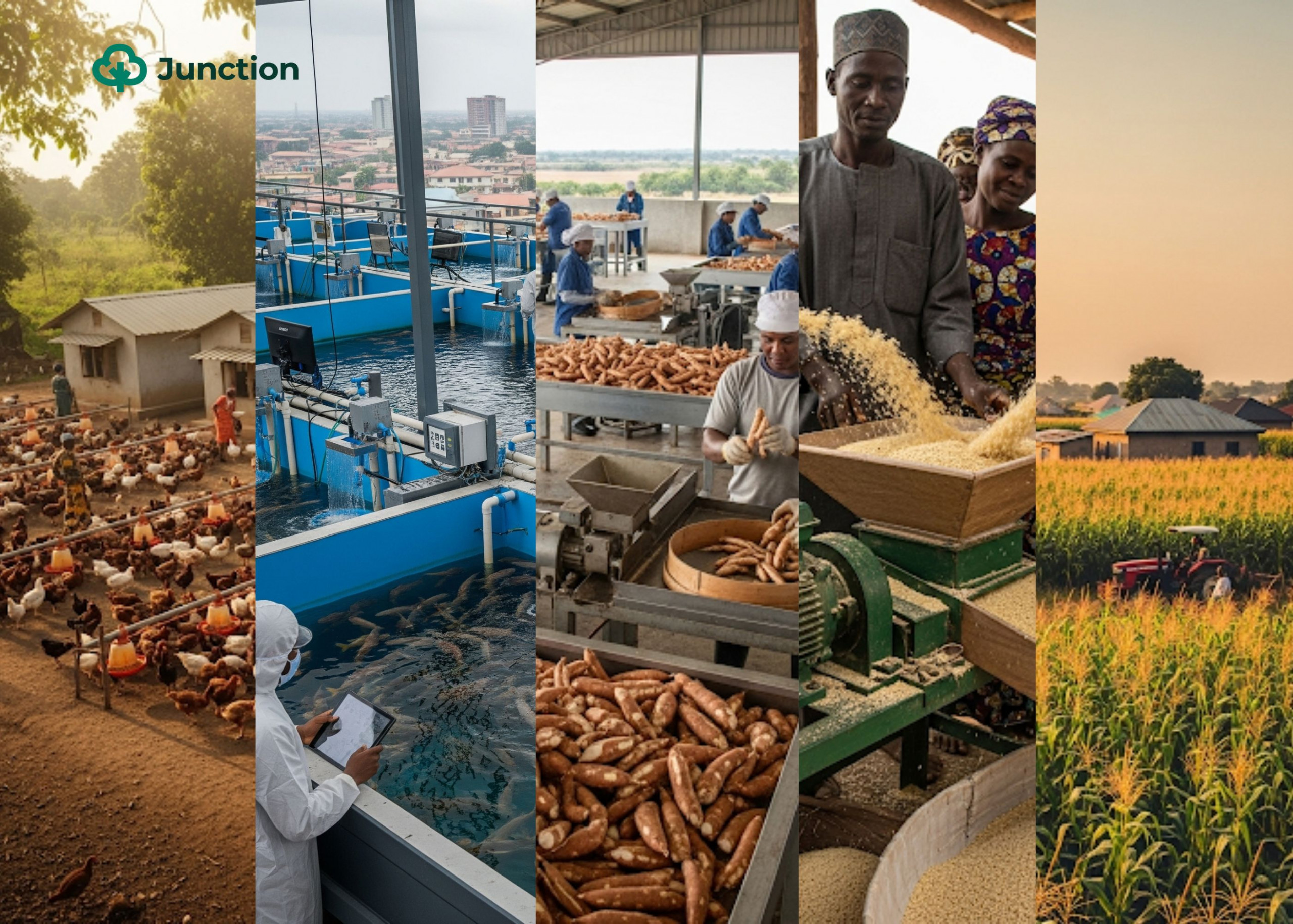Nigeria’s agribusiness sector presents a wealth of opportunities for entrepreneurs looking to capitalise on the country’s vast agricultural potential and growing population.
While various sub-sectors offer promising returns, certain areas consistently demonstrate high profitability due to strong demand, relatively short production cycles, and the potential for value addition.
Here are the top five most profitable sectors in agribusiness in Nigeria.
Top Five Most Profitable Agribusiness Sub-Sectors In Nigeria
1. Poultry farming
Poultry farming, particularly the production of chicken meat and eggs, stands out as one of the most lucrative agribusiness ventures in Nigeria. The ever-increasing demand for affordable protein sources, coupled with the relatively quick maturity of broilers (meat chickens) within 6-8 weeks, allows for rapid turnover and consistent income.
Also, layer farming for egg production provides a steady, long-term revenue stream once the birds begin laying.
Profitability factors
High demand for chicken and eggs, short production cycles for broilers, relatively low initial investment for small to medium-scale operations, and the potential for multiple production cycles per year.
For instance, a farmer with 1,000 broilers could potentially earn a net profit of ₦2,000,000 to ₦2,500,000 per cycle after about 2 months. Similarly, 1,000 layers could generate a monthly net profit ranging from ₦200,000 to ₦450,000, given the ever-increasing prices of eggs.
Considerations
According to Jimoh Faleye, a bourgeoning poultry farmer in the Ikotun area of Lagos, feed costs represent a significant portion of expenses.
“Poultry farming is very lucrative if everything goes right, which is rarely the case, especially with regard to input costs, especially feed,” he explained.
Faleye advocates for efficient feed management as a means to maximise poultry size and health. Also, he reveals that disease control and access to reliable markets are very vital for sustained profitability.
2. Fish farming (catfish)
Fish farming, especially catfish cultivation, has emerged as a highly profitable and rapidly expanding sector within Nigerian agribusiness. Fish is a widely consumed protein source in Nigeria, and catfish is particularly popular due to its taste and versatility in local cuisine.
Profitability factors
High and consistent demand for fish, relatively low startup capital for small-scale farms, and the potential for high returns on investment with proper management.
Georgina Ogbu owns one of the most popular restaurant and fish grilling spots in Iyana-Iba LCDA of Lagos. She says that all of her catfish needs are supplied from her own fish farm in the outskirts of the city.
According to her, with an initial investment of around ₦1,115,000 for 500 fingerlings, a farmer could potentially generate sales of about ₦1,425,000 after approximately four months, yielding a gross profit margin of around 27.8%.
Considerations
Maintaining water quality, proper feeding, and disease management are critical for success. Value addition through smoking or canning can further enhance profitability.
3. Rice production and processing
Rice is a staple food in Nigeria, and the demand for locally grown rice continues to rise as the government encourages domestic production. Investing in rice farming, especially when coupled with processing capabilities, can yield significant profits.
Profitability factors
High and expanding market demand, potential for multiple harvests per year, and the opportunity to increase profit margins through processing (milling and packaging). Swamp rice cultivation has shown particularly high net returns, with some studies indicating a net return of over ₦700,000 per hectare and a return on investment of over 30%.
Considerations
Initial investments in land, quality seeds (high-yield varieties), and machinery can be substantial. Efficient cost management, access to financing, and mitigating post-harvest losses are crucial for profitability. Owning a small rice mill can significantly increase returns.
4. Cassava processing
Nigeria is the world’s largest producer of cassava, a versatile crop used in various food products like garri, fufu, and starch. Processing cassava into these value-added products offers significant profit potential.
Profitability factors
High demand for cassava-based food products, the ability to create more stable and transportable products, and the potential to reduce post-harvest losses. Studies in various states have shown that cassava processing is a profitable venture, with benefit-to-cost ratios often exceeding 1.7, indicating a substantial return on investment.
For instance, cassava processors in some regions have reported net profits ranging from ₦33,000,000 to over ₦64,000,000.
Considerations
Processing requires investment in equipment and adherence to quality standards. Access to a consistent supply of cassava and efficient marketing are important factors.
5. Maize farming
Maize is a crucial crop in Nigeria, serving as both a staple food for human consumption and a key ingredient in animal feed. Its versatility and high demand make maize farming a profitable venture.
Profitability factors
Strong and growing demand from both households and the animal feed industry, relatively short growing cycles, and the potential for intercropping with other crops like melon to maximise land use and returns. Some studies have indicated net farm incomes from maize production of over ₦780,000 per hectare, with a return on investment exceeding 60%.
Considerations
Soil fertility management, access to quality seeds and fertilisers, and effective pest and disease control are essential for maximising yields and profitability. Market price fluctuations can also impact returns.
5 general considerations for agribusiness in Nigeria
- Access to Finance: Securing adequate funding remains a challenge for many agribusiness ventures in Nigeria.
- Infrastructure: Inadequate infrastructure, including transportation networks and storage facilities, can lead to post-harvest losses and increased operational costs.
- Government Policies: While the government is promoting local agricultural production, inconsistent policies can create uncertainty.
- Climate Change: Farmers need to adopt climate-smart agricultural practices to mitigate the risks associated with changing weather patterns.
- Market Access: Establishing reliable market linkages is crucial for selling produce at profitable prices.
Despite these challenges, the agribusiness sector in Nigeria holds immense potential. Therefore, adopting efficient farming and processing techniques is key to unlocking the profitability that these top five areas offer for entrepreneurs



